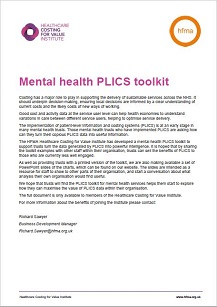Technical / Technical review May 2017
Changes are needed to the way ambulatory emergency care is recorded to support payment approaches that incentivise treatment options that do not require patients to be admitted to hospital and stay overnight.
This was one of the key conclusions of a survey by the HFMA’s National Payment Systems Group. A best practice tariff is currently in place to incentivise ambulatory care for a number of specified clinical scenarios. However, the survey revealed a range of different ways for recording these contacts – including non-elective emergency admissions and outpatient appointments – with national and local price payment mechanisms in place. Respondents suggested a third category of patient care – other than admitted or outpatient – was needed. They also called for greater clarity over recording and collecting data.
The Northern Ireland Department of Health has published healthcare resource group (HRG) cost schedules for 2015/16. The schedules cover acute hospital activity covering elective, non-elective long stay, non-elective short stay and day cases, while also listing excess bed days. They give information on activity and average cost information, alongside minimum and maximum spend across all health and social care trusts.
NHS Improvement made changes to its 
Model Hospital information portal during April. New compartments have been added for pathology and doctor productivity, while data has been refreshed in four other compartments: pharmacy; nursing and midwifery; allied health professionals; and visitor cost recovery. A number of clinical services compartments – helping to align with the Getting it right first time programme – have also been populated with a standard set of productivity and efficiency metrics. In addition, the oversight body has been adding key performance metrics from the single oversight framework to board-level oversight compartments. These compartments were set to go live at the end of April.
The HFMA is currently planning its policy, research and technical work for 2017/18. Each year, it aims to produce a range of outputs, from those that have a very technical focus to those that are more strategic and position the HFMA as a thought leader. To help it prioritise activities, members have been asked to complete a survey (deadline Monday 8 May). The survey contains a list of potential topics, which would be in addition to regular outputs such as the introductory guides series, the suite of e-learning modules, work on costing and value and responding to consultation papers. The final work programme will be published in July.
The HFMA Healthcare Costing for Value 
Institute has published Patient-level information and costing system toolkit for mental health services. Adding to the previously published acute services version, the new toolkit, which includes a briefing and Powerpoint presentation, aims to support costing and finance practitioners and others in selling the benefits of PLICS to boards, clinicians and other staff. It also supports organisations in turning the data generated by PLICS into useful information to support decision making. A ‘top tips’ section sets out lessons from organisations that have successfully developed PLICS reports and rolled them out across their organisations. The kit includes a series of charts that can be used to demonstrate the power of the data. These are based on examples provided by mental health trusts and focus on both individual service users and teams/localities. The toolkit is freely available to institute members. Non-members can see a summary of the contents on the HFMA website.
Related content
The Institute’s annual costing conference provides the NHS with the latest developments and guidance in NHS costing.
The value masterclass shares examples of organisations and systems that have pursued a value-driven approach and the results they have achieved.